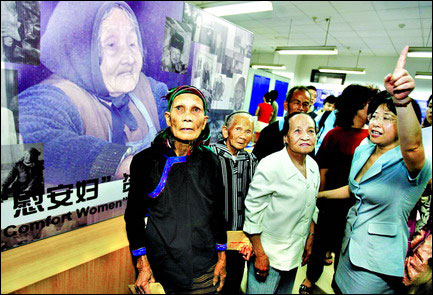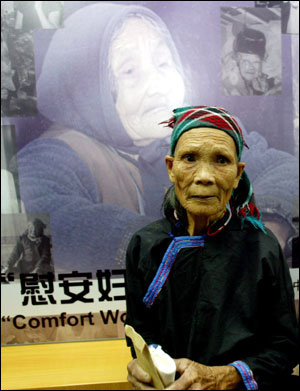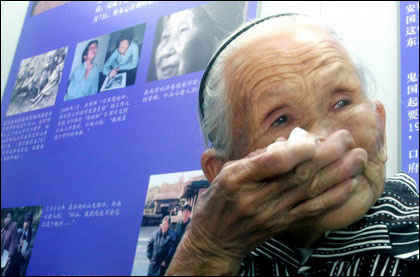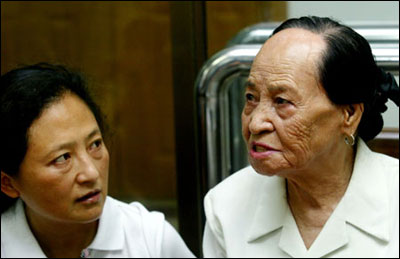| Home / Top News | Tools: Save | Print | E-mail | Most Read |
| China's 1st Comfort Women Archives Inaugurated |
| Adjust font size: |
Forty-eight display boards and 80 exhibits were shown in the archives, including wooden sculptures of Mount Fuji taken from the Daiichi Salon in Shanghai - the world's first comfort station set up by the Japanese invading army - audio recordings and written accounts by Chinese comfort women, disinfectants that Lei Guiying, a former comfort woman in Nanjing took when she fled the brothel where she was forced to be a sex slave, boxes of condoms and pictures of Japanese soldiers. The archives also contain documents on 158 comfort stations in
Fomer comfort women attend the opening ceremony of China's first archives on comfort women in Shanghai on Thursday.
Su said their research shows there were 200,000 comfort women in China, but only 47 are still alive and have said publicly that they are comfort women. It is believed there may be many more who have remained silent.
Former comfort woman Lin Yajin from Hainan at the archives Lei Guiying, one of the few remaining known comfort women who survived the war, died of a brain hemorrhage on April 25. She was 79. In an interview in March with the Times newspaper, Lei said that she was ready to file a case against the Japanese government for its war crimes. "We have set up the archives so people are aware of the victims who are still alive and remind the Chinese people that although years have passed, the comfort women have not become part of the past," Su said. Three former comfort women, Wan Aihua from
Former comfort woman Wei Shaolan from Guangxi Zhuang Autonomous Region at the archives Wei was accompanied by her son Luo Shanxue, born as a result of forced relations with a Japanese soldier. "I want to redress the injustice for me and for all my sisters who suffered, which was why I came forward and admitted that I was once a sex slave for the Japanese military," 79-year-old Wan said. "The exhibits tell us how beauty was ruined and lives devastated, and how these women have endured so much but are still fighting for their lives and dignity," said Wang Xuan, a Chinese woman who heads the delegation of plaintiffs demanding an apology and compensation from the Japanese government over the germ warfare. The plaintiffs' appeal was dismissed in May by the Japanese Supreme Court, which upheld the rulings that the current Japanese government is not liable for compensation demands from foreign citizens for wartime actions. Wang said they would continue the lawsuit and appeal to the U.N. Commission on Human Rights.
Wan Aihua told her horrible experiences as a former comfort woman to Wang Xuan, head of a non-governmental plaintiff group in the lawsuit against Japan's germ warfare in China. The exhibition was opened two days before the 70th anniversary of the "July 7 Incident" in 1937, which marked the beginning of the War of Resistance against Japanese Aggression in China, and will be open to the public from 9: On Tuesday, a group of Chinese researchers investigating the comfort women issue released a report, saying one comfort station was still being used by the Japanese military in On June 28, Chinese Foreign Ministry spokesman Qin Gang urged the Japanese government "to seriously and properly resolve" the issues of comfort women and forced Chinese laborers during World War II. Qin made the comments in response to a bill passed by a U.S. House panel on June 26, urging
Cheng Fei, adopted daughter of deceased comfort woman Yuan Linzhu, shows things left behind by her mother, with her eyes full of tears.
A visitor looks at exhibits at the archives. (Xinhua News Agency July 6, 2007)
|
| Tools: Save | Print | E-mail | Most Read |
 |
| Related Stories |





